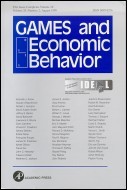Games and Economic Behavior facilitates cross-fertilization between theories and applications of game theoretic reasoning. It consistently attracts the best quality and most creative papers in interdisciplinary studies within the social, biological, and mathematical sciences. Most readers recognize it as the leading journal in game theory.
applications of game theoretic reasoning. It consistently attracts the best quality and most creative papers in interdisciplinary studies within the social, biological, and mathematical sciences. Most readers recognize it as the leading journal in game theory.
Expanded Number of Editors at Games and Economic Behavior
(Announcement to Editors, Referees and Authors of GEB by Ehud Kalai, December 2007)
I am happy to announce that the number of GEB editors will be expanded from one to five, starting in the year 2008. In particular, Matthew Jackson, Ehud Lehrer, Thomas Palfrey and David Parkes have agreed to share with me the role of an editor.
There are two important reasons for this expansion.
- Since the launching of the journal in 1989 the number of annual submissions has quadrupled. With five people sharing the load, individual papers will receive better individual attention.
- The proliferation of game theoretic work to additional areas requires a higher degree of specialization in the editorial work, which is possible with a larger number of editors. Not only will editors deal with papers closer to their own expertise, but the union of the conferences attended by the five editors, and the expanded exposure of the journal to different groups of researchers, will be significantly enhanced. Other than the increased number of editors, the editorial process will remain unchanged. Each submitted paper will be assigned to one of the five Editors, to be the (publically known) Editor in Charge of the paper.
The Editor in Charge will assign the paper to an (anonymous) Advisory Editor, in the same manner as I have been doing until now. The Advisory Editor, together with referees of his or her choice, will pass a recommendation to the Editor in Charge. And the Editor in Charge will make the final decision and communicate it directly to the submitting author.
I anticipate that the enhanced communication (in depth and breadth) of research, achieved through the expanded GEB, should bring about significant development of the field of game theory and its applications. I thank the four new editors for accepting this responsibility, and I thank the rest of the GEB community for their participation.

No Comments Yet